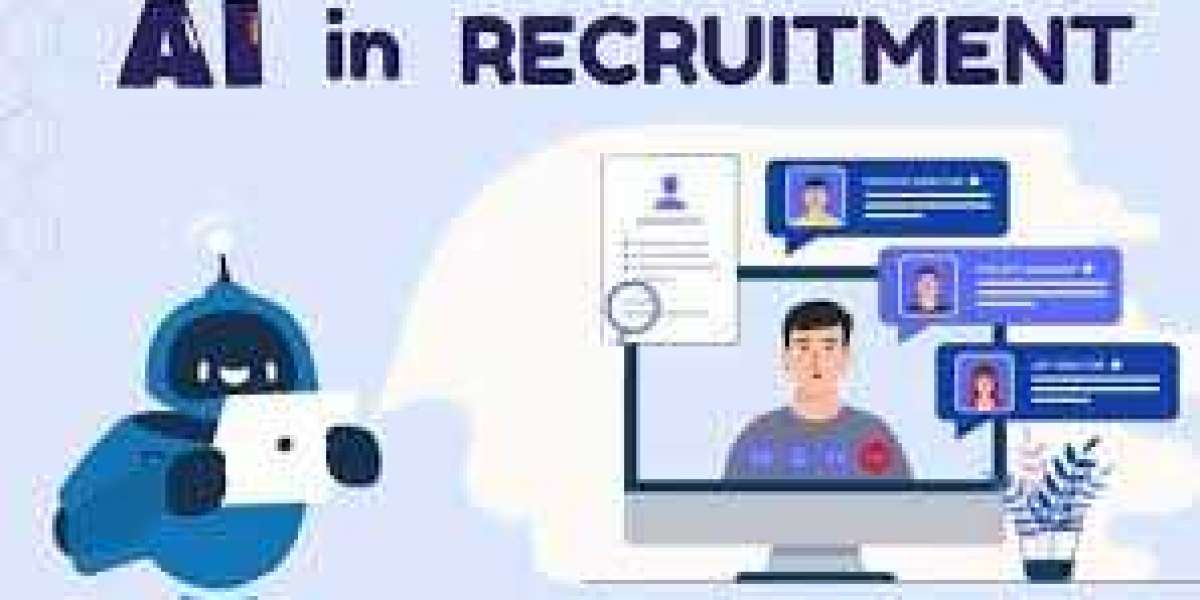AI Recruitment Market: A Comprehensive Overview
Artificial Intelligence (AI) is transforming various industries, and recruitment is no exception. The AI recruitment market is experiencing rapid growth as organizations seek to enhance their hiring processes through advanced technologies. This article provides a detailed overview of the AI recruitment market, examining key segments, recent industry news, leading companies, market drivers, and regional insights to offer a comprehensive understanding of this evolving landscape. The AI Recruitment market industry is projected to grow from USD 617.5 Million in 2024 to USD 1,053.16 Million by 2032
Market Overview
The AI recruitment market involves the application of AI technologies to streamline and improve the hiring process. AI tools assist in various stages of recruitment, from sourcing and screening candidates to interviewing and onboarding. These technologies leverage machine learning, natural language processing (NLP), and predictive analytics to identify the best candidates, reduce hiring biases, and enhance overall efficiency.
As businesses face increasing pressure to attract and retain top talent, the adoption of AI in recruitment is growing. The market is driven by the need for more efficient hiring processes, improved candidate experience, and data-driven decision-making. The integration of AI in recruitment helps organizations save time and resources while ensuring a higher quality of hire.
Request To Free Sample of This Strategic Report - https://www.marketresearchfuture.com/sample_request/8289
Key Market Segments
The AI recruitment market can be segmented based on technology, application, organization size, industry vertical, and region.
1. Technology
- Machine Learning: Machine learning algorithms are used to analyze resumes, predict candidate success, and automate repetitive tasks. These algorithms improve over time, providing more accurate insights.
- Natural Language Processing (NLP): NLP enables AI tools to understand and process human language, making it possible to analyze resumes, conduct virtual interviews, and assess candidate responses.
- Chatbots and Virtual Assistants: AI-powered chatbots and virtual assistants handle initial candidate interactions, answer queries, and schedule interviews, enhancing the candidate experience and reducing the workload for recruiters.
2. Application
- Resume Screening: AI tools automate the screening of resumes, identifying the most suitable candidates based on predefined criteria. This reduces the time spent on manual screening and ensures a more objective selection process.
- Candidate Sourcing: AI-driven platforms search various databases and social media to find potential candidates, expanding the talent pool and identifying passive candidates who may not be actively job hunting.
- Interviewing: AI-powered video interview platforms analyze candidate responses, facial expressions, and voice tones to provide insights into their suitability for the role.
- Onboarding: AI tools assist in the onboarding process by automating paperwork, providing personalized training plans, and ensuring a smooth transition for new hires.
3. Organization Size
- Small and Medium Enterprises (SMEs): SMEs benefit from AI recruitment tools by automating manual processes and accessing a wider talent pool without significant investment.
- Large Enterprises: Large organizations use AI recruitment technologies to handle high volumes of applications, streamline their hiring processes, and make data-driven hiring decisions.
4. Industry Vertical
- Information Technology (IT): The IT sector is a major adopter of AI recruitment tools, leveraging technology to find skilled professionals in a competitive market.
- Healthcare: Healthcare organizations use AI recruitment to find qualified medical professionals and support staff, ensuring compliance with industry regulations.
- Retail: Retailers use AI tools to handle seasonal hiring spikes and identify candidates with the right customer service skills.
- Finance: Financial institutions leverage AI to ensure regulatory compliance and find candidates with specific financial expertise.
5. Region
- North America: The largest market for AI recruitment, driven by technological advancements and high adoption rates across various industries.
- Europe: Significant growth due to supportive government policies, increasing investments in AI technologies, and a focus on improving hiring processes.
- Asia-Pacific: Rapidly growing market, with countries like China, India, and Japan investing heavily in AI recruitment technologies to address talent shortages.
- Latin America and Middle East Africa: Emerging markets with increasing adoption of AI tools to enhance recruitment efficiency and address workforce challenges.
Industry Latest News
The AI recruitment market is dynamic, with continuous innovations and developments shaping its future. Recent news highlights the sector's rapid evolution:
- LinkedIn's AI Enhancements: LinkedIn has integrated advanced AI tools to improve job matching, candidate recommendations, and recruiter insights, enhancing the overall hiring process.
- Google's AI Recruitment Tool: Google has launched a suite of AI-powered recruitment tools, including resume parsing and candidate screening, to help businesses find the right talent more efficiently.
- Microsoft's AI Acquisition: Microsoft acquired an AI recruitment startup to enhance its LinkedIn Talent Solutions, focusing on improving candidate sourcing and matching through advanced AI algorithms.
- AI-Driven Diversity Hiring: Several AI recruitment platforms have introduced features to reduce bias and promote diversity in hiring, ensuring fair and inclusive recruitment practices.
- Virtual Job Fairs: AI-powered virtual job fairs are becoming more common, allowing employers to connect with potential candidates remotely and efficiently.
Key Companies
Several key players are driving innovation and growth in the AI recruitment market:
1. LinkedIn
LinkedIn, a leading professional networking platform, has integrated AI tools to enhance its recruitment solutions. Their AI-driven features help in job matching, candidate recommendations, and providing actionable insights to recruiters.
2. HireVue
HireVue specializes in AI-powered video interviewing and assessments. Their platform uses machine learning and predictive analytics to evaluate candidate responses, providing insights into their suitability for the role.
3. IBM
IBM's AI recruitment solutions leverage Watson, their AI platform, to automate resume screening, candidate sourcing, and provide personalized candidate experiences. IBM focuses on using AI to reduce bias and improve hiring decisions.
4. Google
Google's AI recruitment tools offer advanced features like resume parsing, candidate screening, and job matching. Their focus on leveraging AI for data-driven hiring decisions makes them a key player in the market.
5. Pymetrics
Pymetrics uses neuroscience-based assessments and AI to match candidates with the right job roles. Their platform focuses on reducing bias and promoting diversity in hiring through objective data analysis.
Market Drivers
Several factors are driving the growth of the AI recruitment market:
1. Need for Efficient Hiring Processes
Businesses are seeking to streamline their recruitment processes to reduce time-to-hire and operational costs. AI tools automate repetitive tasks, allowing recruiters to focus on strategic decision-making.
2. Demand for Quality Hires
The pressure to attract and retain top talent is pushing organizations to adopt AI recruitment tools. These tools provide data-driven insights, ensuring a higher quality of hire and better candidate fit.
3. Increasing Volume of Applications
With the growth of online job applications, recruiters are overwhelmed with large volumes of resumes. AI tools help in efficiently screening and shortlisting candidates, saving time and resources.
4. Technological Advancements
Advancements in AI technologies, such as machine learning and NLP, are driving the adoption of AI recruitment tools. These technologies offer innovative solutions for various stages of the hiring process.
5. Focus on Reducing Bias
AI recruitment tools are designed to reduce unconscious bias in hiring, promoting diversity and inclusion. These tools use objective criteria to evaluate candidates, ensuring fair and unbiased hiring decisions.
Ask for Customization - https://www.marketresearchfuture.com/ask_for_customize/8289
Regional Insights
The adoption and growth of AI recruitment technologies vary across regions, influenced by factors such as technological infrastructure, investment levels, and industry demand.
North America
North America leads the AI recruitment market, driven by advanced technological infrastructure and high adoption rates. The presence of major tech companies and innovative startups further propels the market.
Europe
Europe is experiencing significant growth in the AI recruitment market. Supportive government policies, increasing investments in AI technologies, and a focus on improving hiring processes contribute to the region's expansion.
Asia-Pacific
The Asia-Pacific region is witnessing rapid growth, with countries like China, India, and Japan investing heavily in AI recruitment technologies. The region's growing economy and talent shortages drive the demand for AI solutions.
Latin America and Middle East Africa
These regions are emerging markets for AI recruitment, with increasing adoption of AI tools to enhance recruitment efficiency and address workforce challenges. Investments in AI technologies and infrastructure are expected to rise in the coming years.
Conclusion
The AI recruitment market is poised for substantial growth, driven by the increasing need for efficient hiring processes, quality hires, and unbiased recruitment practices. Key market segments, including machine learning, NLP, and AI-powered chatbots, are at the forefront of this expansion. Leading companies like LinkedIn, HireVue, and IBM are driving innovation, while regional insights highlight the varying adoption levels and growth potential across different areas. As AI technologies continue to evolve, their impact on recruitment will deepen, promising a future of more efficient, data-driven, and inclusive hiring practices.
Explore MRFR’s Related Ongoing Coverage In ICT Domain:
Geospatial Analytics Market -
https://www.globenewswire.com/news-release/2023/04/29/2657966/0/en/Geospatial-Analytics-Market-Estimated-To-Garner-USD-209-47-Billion-By-2030-Report-by-Market-Research-Future-MRFR.html
Payment as a Service Market -
https://www.globenewswire.com/en/news-release/2023/03/21/2631017/0/en/Payment-as-a-Service-Market-Predicted-To-Surpass-USD-56-6-Billion-at-a-CAGR-of-24-10-by-2030-Report-by-Market-Research-Future-MRFR.html
Mobile Payments Market -
https://www.globenewswire.com/en/news-release/2022/07/11/2477396/0/en/Mobile-Payments-Market-Size-Projected-to-Surpass-USD-11-85-Billion-with-a-CAGR-of-29-5-by-2030-Report-by-Market-Research-Future-MRFR.html







